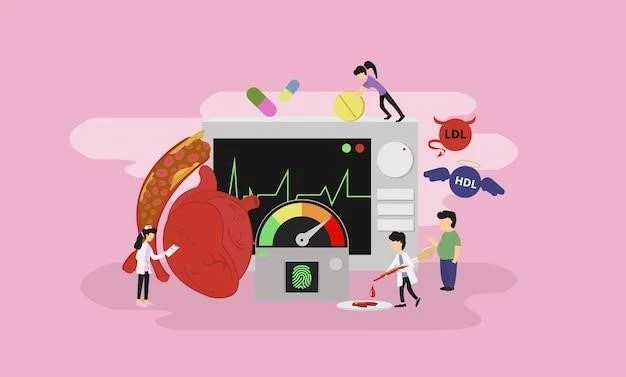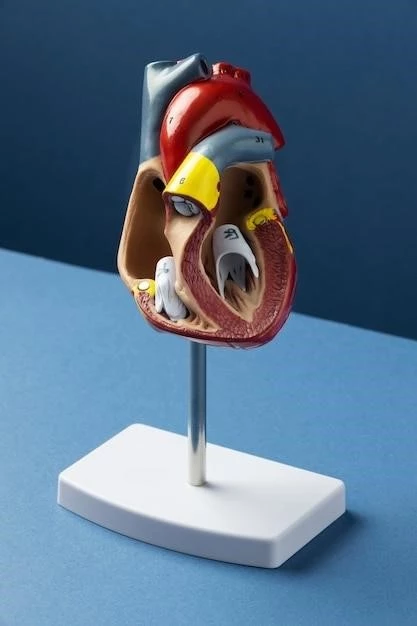Infectious Myocarditis
Introduction
Infectious myocarditis is a condition characterized by inflammation of the myocardium‚ most commonly caused by a viral‚ bacterial‚ or other infection. This condition can lead to serious complications affecting the heart’s function. Understanding the causes‚ symptoms‚ diagnosis‚ treatment options‚ prognosis‚ and prevention strategies for infectious myocarditis is crucial for managing this potentially life-threatening condition.
Myocarditis can affect individuals of all ages‚ but it is more prevalent in younger adults. Early recognition and appropriate management of infectious myocarditis are essential in preventing further damage to the heart muscle and minimizing the risk of long-term complications. By exploring the various aspects of this condition‚ including its underlying causes‚ mechanisms‚ and clinical implications‚ healthcare professionals can better diagnose and treat patients with infectious myocarditis.

Causes of Infectious Myocarditis
Infectious myocarditis can be caused by a variety of infectious agents‚ including viruses such as enteroviruses‚ adenoviruses‚ and influenza virus‚ as well as bacteria like Streptococcus and Staphylococcus. These pathogens can enter the myocardium either directly through the bloodstream or indirectly through the lymphatic system.
Other less common causes may include fungal or parasitic infections. In addition to infectious agents‚ autoimmune reactions triggered by infections in other parts of the body can also lead to myocardial inflammation. Certain medications‚ environmental toxins‚ and radiation therapy may contribute to the development of infectious myocarditis in susceptible individuals.
Understanding the specific infectious triggers of myocarditis is crucial for tailoring treatment approaches and managing the condition effectively. By identifying and addressing the underlying cause of the infection‚ healthcare providers can improve the prognosis for patients with infectious myocarditis and reduce the risk of recurrent episodes or complications.
Pathophysiology
The pathophysiology of infectious myocarditis involves the invasion of the myocardium by infectious agents‚ leading to an inflammatory response in the heart muscle. When viruses or bacteria enter the myocardial tissue‚ they can directly damage the cardiac cells and trigger an immune response.
Once the immune system is activated‚ inflammatory cells infiltrate the myocardium to combat the infection. However‚ in some cases‚ this immune response can become dysregulated‚ causing excessive inflammation and further damage to the myocardial tissue. This can result in the disruption of normal cardiac function and the development of symptoms associated with myocarditis.
As the infection progresses‚ the myocardium may experience structural changes‚ such as fibrosis or scarring‚ which can impair the heart’s ability to pump blood effectively. Severe cases of infectious myocarditis can lead to dilated cardiomyopathy‚ arrhythmias‚ heart failure‚ or even sudden cardiac death.
Understanding the pathophysiological mechanisms underlying infectious myocarditis is essential for determining appropriate treatment strategies and interventions. By targeting the inflammatory response‚ managing cardiac dysfunction‚ and supporting overall cardiac health‚ healthcare providers can help mitigate the impact of infectious myocarditis on the heart and improve patient outcomes.
Symptoms of Infectious Myocarditis
The symptoms of infectious myocarditis can vary widely and may range from mild to severe. Common symptoms include chest pain or discomfort‚ shortness of breath‚ fatigue‚ palpitations‚ and swelling in the legs or abdomen. Patients with infectious myocarditis may also experience flu-like symptoms‚ such as fever‚ body aches‚ and joint pain.
In some cases‚ individuals with myocarditis may present with signs of heart failure‚ including rapid or irregular heartbeat‚ difficulty breathing‚ and excessive fatigue during physical activity. Severe cases of infectious myocarditis can lead to cardiogenic shock‚ a life-threatening condition characterized by a sudden drop in blood pressure and inadequate blood flow to vital organs.
It is important to note that the symptoms of infectious myocarditis can mimic those of other cardiac and respiratory conditions‚ making diagnosis challenging. Healthcare providers should consider a thorough clinical evaluation‚ including a comprehensive medical history‚ physical examination‚ imaging studies‚ and laboratory tests‚ to accurately diagnose infectious myocarditis and initiate appropriate treatment.
Diagnosis
Diagnosing infectious myocarditis involves a combination of clinical assessment‚ laboratory tests‚ imaging studies‚ and cardiac procedures. Healthcare providers may begin the diagnostic process by reviewing the patient’s medical history‚ symptoms‚ and risk factors for cardiac disease. Physical examination findings‚ such as abnormal heart sounds or fluid retention‚ can also provide valuable clues.
Laboratory tests‚ including blood tests to assess markers of inflammation and cardiac damage‚ can help support the diagnosis of myocarditis. Imaging studies such as echocardiography‚ cardiac magnetic resonance imaging (MRI)‚ and computed tomography (CT) scans may be used to visualize the structure and function of the heart and detect any abnormalities.
In some cases‚ a myocardial biopsy may be performed to confirm the presence of inflammation and infection in the myocardium. This procedure involves obtaining a small sample of heart tissue for microscopic examination. However‚ due to its invasive nature‚ myocardial biopsy is typically reserved for cases where the diagnosis remains uncertain or when specific treatment decisions depend on tissue analysis.
Early and accurate diagnosis of infectious myocarditis is crucial for initiating timely treatment and preventing complications. By employing a multidisciplinary approach that integrates clinical findings‚ laboratory tests‚ and advanced imaging modalities‚ healthcare providers can effectively diagnose infectious myocarditis and tailor treatment strategies to individual patient needs.
Treatment Approaches
The treatment of infectious myocarditis aims to control the infection‚ reduce inflammation in the myocardium‚ manage symptoms‚ and preserve cardiac function. Depending on the severity of the condition and the underlying cause‚ treatment approaches may include a combination of medications‚ lifestyle modifications‚ and supportive care.
Antiviral or antibacterial medications may be prescribed to target the specific infectious agent responsible for myocarditis. Anti-inflammatory drugs‚ such as corticosteroids or immunosuppressants‚ may be used to reduce myocardial inflammation and prevent further damage to the heart muscle.
In cases where infectious myocarditis leads to heart failure or arrhythmias‚ medications like beta-blockers‚ ACE inhibitors‚ diuretics‚ or anticoagulants may be recommended to improve heart function and prevent complications. Patients with severe or refractory myocarditis may require advanced heart failure therapies‚ including mechanical circulatory support or heart transplantation.
Alongside medical treatment‚ lifestyle modifications such as dietary changes‚ exercise restrictions‚ and smoking cessation may be advised to support heart health and reduce the risk of recurrent infections. Cardiac rehabilitation programs and regular follow-up visits with healthcare providers can help monitor the heart’s function and overall well-being.
Individualized treatment plans for infectious myocarditis should be developed in collaboration with a multidisciplinary team of healthcare professionals‚ including cardiologists‚ infectious disease specialists‚ and cardiac surgeons. By addressing the infection‚ inflammation‚ and cardiac dysfunction comprehensively‚ healthcare providers can optimize outcomes for patients with infectious myocarditis and improve their quality of life.
Prognosis and Complications
The prognosis of infectious myocarditis can vary depending on the underlying cause‚ severity of myocardial damage‚ and the timeliness of treatment. In cases where myocarditis is promptly diagnosed and managed‚ patients may experience a full recovery with minimal long-term consequences.
However‚ infectious myocarditis can lead to a range of complications that affect the heart’s structure and function. These complications may include dilated cardiomyopathy‚ arrhythmias‚ heart failure‚ and even sudden cardiac death. Patients with severe myocarditis or those who develop persistent cardiac dysfunction may be at increased risk of recurrent infections and long-term cardiovascular complications.
Monitoring and managing potential complications of infectious myocarditis are essential to improving patient outcomes and quality of life. Regular follow-up visits with healthcare providers‚ routine cardiac imaging studies‚ and ongoing assessment of cardiac function can help detect and address complications early.
Although some individuals may experience persistent symptoms or ongoing cardiac issues following an episode of infectious myocarditis‚ others may recover fully and resume their normal activities. The long-term prognosis for patients with infectious myocarditis depends on various factors‚ including the extent of myocardial damage‚ the effectiveness of treatment‚ and the presence of underlying cardiovascular conditions.
Prevention Strategies
Preventing infectious myocarditis involves reducing the risk of exposure to infectious agents‚ promoting overall heart health‚ and addressing underlying conditions that may predispose individuals to myocardial inflammation. Some key strategies for preventing infectious myocarditis include⁚
- Practice Good Hygiene⁚ Regular handwashing‚ avoiding close contact with individuals who are ill‚ and following recommended vaccination schedules can help reduce the spread of infectious diseases.
- Healthy Lifestyle Choices⁚ Maintaining a balanced diet‚ engaging in regular physical activity‚ managing stress levels‚ and avoiding tobacco and excessive alcohol consumption can support cardiovascular health and overall well-being.
- Seek Prompt Medical Treatment⁚ Individuals experiencing symptoms of infection‚ particularly respiratory or flu-like symptoms‚ should seek prompt medical attention to prevent the progression of an infection to myocarditis.
- Monitor Underlying Conditions⁚ Managing chronic conditions such as diabetes‚ hypertension‚ and autoimmune disorders can help reduce the risk of developing infectious myocarditis.
- Follow Treatment Plans⁚ Individuals with a history of myocarditis or heart conditions should follow their healthcare provider’s recommendations for medications‚ lifestyle modifications‚ and regular follow-up visits to prevent recurrent infections and complications.
By adopting a holistic approach to heart health‚ practicing preventive measures‚ and staying informed about infectious diseases‚ individuals can reduce their risk of developing infectious myocarditis and promote a healthy heart lifestyle. Education‚ awareness‚ and early intervention play key roles in preventing myocardial inflammation and protecting cardiovascular well-being.
